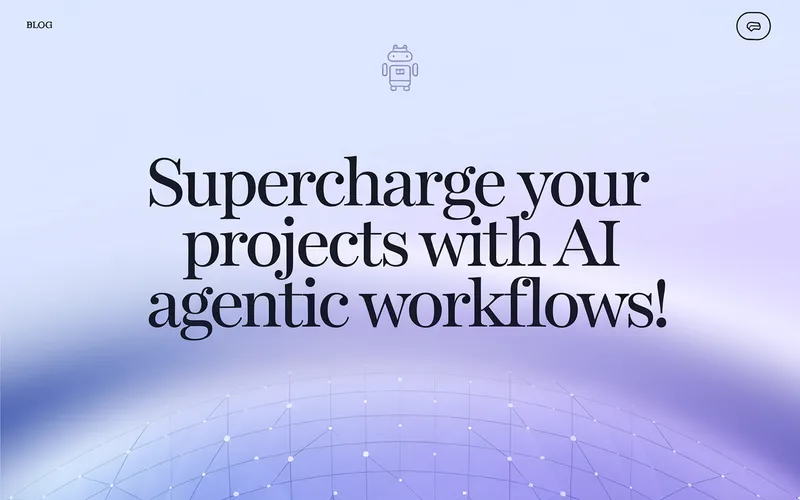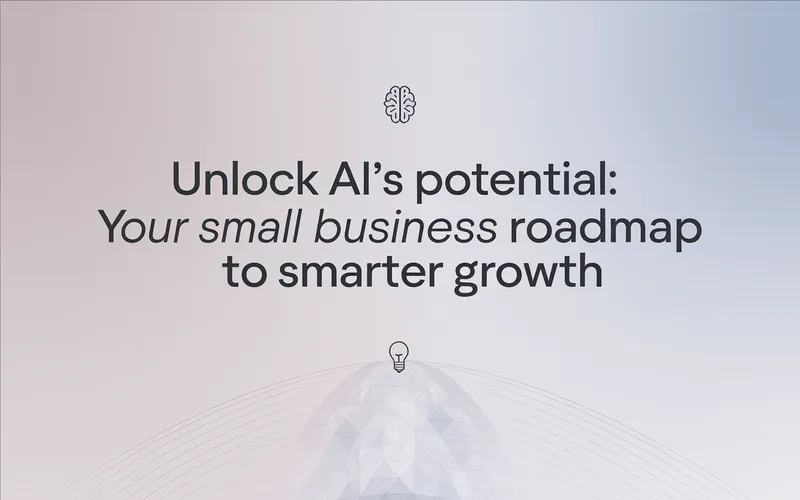
In today’s rapidly evolving business landscape, small businesses are increasingly turning to AI solutions for small businesses to unlock significant efficiency gains. With tightening competition and customer demands growing by the day, small enterprises cannot afford to rely solely on traditional methods. Instead, they are opting for intelligent, data-driven approaches that harness the power of artificial intelligence (AI). As technology continues to evolve, AI is becoming an essential tool not only for automating menial tasks but also for providing deep insights into customer behavior, streamlining supply chains, and enhancing overall business efficiency. This blog post will dive into how AI solutions for small businesses are revolutionizing various aspects of operations, from solving complex challenges to deploying cutting-edge AI technologies for efficiency. Business owners, C-level executives, and IT managers will gain valuable insights into understanding AI solutions, effective implementation strategies, and witnessing real-life success stories that illustrate the transformative benefits of AI for business efficiency.
Throughout this post, we will explore the reasons behind the increasing momentum for adopting AI in small enterprises, provide an overview of the most advanced AI technologies, and offer practical advice on leveraging these tools to optimize business operations. Whether you are new to AI or already exploring the options, this comprehensive guide is tailored to help you understand the multifaceted benefits and strategic implementations that drive efficiency and customer satisfaction.

Understanding AI Solutions for Small Business Challenges
Small businesses face a variety of challenges ranging from limited resources, streamlined operations, and fierce competition. AI solutions for small businesses offer a way to overcome these hurdles by automating routine tasks and enabling data-driven decision making. In this section, we will explore the common challenges for small enterprises and look at how AI can be applied as a strategic tool to combat these issues.
One of the main challenges that small business owners frequently confront is the necessity to maximize operational efficiency while operating on a limited budget. By deploying AI for business efficiency, owners can automate repetitive tasks such as inventory management, customer support, and even marketing campaigns. With AI handling day-to-day operations, employees can focus on high-value tasks like strategic planning and relationship building with customers.
Another challenge lies in managing customer satisfaction in a market where personalized service and quick responses are paramount. AI-driven tools, such as chatbots and customer insight platforms, can analyze large amounts of data to provide real-time answers to queries and deliver personalized recommendations. This not only improves customer retention but also boosts the overall experience. Additionally, AI solutions can aid in monitoring social media for sentiment analysis, ensuring that any issues or trends are caught early and addressed promptly.
Data analytics is another critical area where small businesses often lag behind larger competitors. However, with the advent of AI and machine learning algorithms, even enterprises with limited historical data can now leverage powerful predictive insights. These tools detect patterns, forecast sales trends, and adjust operations to better match projected market demands. The use of AI for business efficiency thus becomes a compelling argument for small businesses; with an analytical approach, decisions can be made based on facts rather than intuition alone.
Furthermore, the integration of AI reduces operational errors by automating processes that are prone to human error. This transition not only improves accuracy but also leads to significant cost savings over time. As small businesses strive to remain agile, the systematic implementation of AI becomes a key differentiator in maintaining competitive advantages in today’s fast-paced environment.

By understanding these multifaceted challenges and exploring how AI acts as an essential facilitator for overcoming them, small business leaders can confidently plan their transition into a more efficient and productive future. AI solutions not only reduce operational costs but also pave the way for innovation, enabling better allocation of resources and ultimately driving business growth.
Overview of Cutting-Edge AI Technologies for Efficiency
As small businesses seek innovative approaches to enhance efficiency, adopting cutting-edge AI technologies for efficiency becomes increasingly popular. This section delves into the latest AI-powered tools and platforms that are transforming various business functions. These technologies are reshaping areas such as customer engagement, process automation, and data analytics, providing small businesses with a clear competitive edge.
One of the most impactful AI technologies in recent years involves natural language processing (NLP) and machine learning algorithms. NLP is a powerful tool in the realm of customer service and engagement, enabling businesses to convert large volumes of unstructured data—such as customer reviews, social media posts, and support tickets—into actionable insights. This technology helps in identifying common concerns, recurring issues, and even areas for product improvement, thereby enhancing overall customer satisfaction.
Another transformative technology is robotic process automation (RPA). RPA utilizes AI to automate routine, rule-based tasks that were once manually executed. By integrating RPA, businesses are now able to reduce turnaround times for essential processes such as invoicing, data entry, and scheduling, thereby achieving unprecedented levels of business efficiency. With operations running on autopilot for many routine tasks, staff can redirect their focus towards more strategic initiatives.
Advances in predictive analytics and big data are also playing a pivotal role in shaping decisions across business units. Through the synergy of AI and data science, small businesses can now forecast trends, predict inventory needs, and tailor their marketing efforts with far greater accuracy. Predictive analytics uses historical data to anticipate future outcomes, ensuring that small entrepreneurs can navigate market uncertainties with confidence. The fusion of these technologies is especially critical for decision-makers who must quickly adapt to ever-changing market conditions.
Furthermore, AI-powered platforms are now being integrated into customer relationship management (CRM) systems, leading to more personalized and effective customer outreach initiatives. These systems leverage data from previous interactions to optimize sales strategies and enhance engagement strategies. In effect, AI for business efficiency is not just about internal process improvement—it also transforms the customer experience by ensuring that interactions are timely, relevant, and personalized.
By embracing these cutting-edge AI technologies for efficiency, small businesses are reaping benefits that extend beyond mere cost savings. They are laying the groundwork for a culture of continuous improvement and innovation. With real-time analytics and intelligent task automation, companies are achieving higher productivity levels and boosting customer satisfaction. These advancements are not just theoretical; they provide tangible returns on investment and enable small businesses to scale operations in a sustainable and organized manner.
Implementation Strategies and Best Practices
Implementing AI solutions for small businesses requires a well-thought-out strategy and rigorous planning. While the benefits are considerable, the process involves careful evaluation of existing workflows, selecting the right technology, and ensuring seamless integration. In this section, we outline proven best practices and strategic considerations to help small businesses adopt AI successfully while minimizing risk and disruption.
The first step in implementing AI is conducting a thorough assessment of operational needs. For any small business, it is essential to identify key areas that will benefit most from automation and actionable insights. Whether it is enhancing customer service or streamlining inventory management, a clear prioritization of tasks is vital. This process often begins with an internal audit that identifies bottlenecks and inefficiencies. By aligning AI technology with specific business challenges, companies can measure potential benefits such as cost reduction, faster service delivery, and improved data accuracy.
Once the primary objectives are clear, businesses should select AI tools that best match these needs. There is a wide array of AI platforms available today, from custom machine learning algorithms to off-the-shelf RPA software. It is essential to prioritize solutions that offer scalability and integration with existing systems. Additionally, selecting tools that feature robust customer support and regular updates can ensure that the technology remains relevant over time.
The next step involves the gradual integration of AI into existing workflows. Instead of a complete overhaul, a phased approach allows businesses to test the waters and identify any unforeseen challenges. This method minimizes disruption while enabling the organization to tweak processes based on early feedback. Pilot projects can serve as a valuable testing ground for measuring ROI and validating that the chosen technology meets the business’s specific requirements.
Data security and compliance also remain a top priority during the implementation process. With the increased use of AI comes a need to safeguard sensitive business and customer data. Establishing clear protocols for data governance, encryption, and access control is non-negotiable. As businesses navigate the complexities of AI integration, partnering with experienced vendors who understand these dynamics can make all the difference. In short, ensuring that the deployment meets regulatory standards and industry best practices safeguards both operational integrity and customer trust.
Furthermore, fostering a culture of learning and adaptation among employees is essential. Training sessions, workshops, and regular updates can help staff become comfortable with new systems. When employees are equipped with the necessary skills, they can fully leverage AI for business efficiency, often coming up with innovative ways to further optimize workflows. A proactive approach to continuous learning ensures that the digital transformation journey remains a collaborative and evolving process.
Case Studies and Success Stories
Real-life examples are powerful testimonies to the transformative impact of AI solutions for small businesses. In this section, we highlight several case studies and success stories from organizations that successfully implemented AI-driven strategies to enhance operational efficiency. These examples provide a tangible snapshot of the benefits that come with integrating sophisticated AI technologies into business operations.
Consider a mid-sized retail business that struggled with inventory management and customer service bottlenecks. By deploying AI-powered predictive analytics and RPA, the company was able to manage stock levels more efficiently and automate order processing. As a result, the business not only reduced operational costs but also enhanced customer satisfaction by ensuring product availability and quick responses to inquiries. This success story is representative of many small businesses that have utilized AI for business efficiency to streamline operations and improve profitability.
In another example, a regional service provider redefined its customer engagement strategy by incorporating AI-driven CRM platforms. The system analyzed customer interactions and purchasing behavior to tailor personalized marketing campaigns. The outcome was a marked increase in repeat business and customer loyalty, underscoring how data-driven insights can reshape customer experience and drive growth. This case highlights the importance of leveraging cutting-edge AI technologies for efficiency to make informed decisions without the need for manual oversight.
Another illustrative case involves a small manufacturing company that faced significant bottlenecks in its production line. The integration of AI monitoring tools and IoT devices enabled real-time tracking of equipment performance. Predictive maintenance became a reality, effectively reducing downtime and maintenance costs. In this instance, the AI solutions not only improved operational workflow but also extended the lifespan of critical machinery. Such examples demonstrate that whether the focus is on marketing, production, or customer service, AI solutions for small businesses can provide targeted, industry-specific advantages.
Each of these case studies shows that successful AI adoption is not confined to large enterprises alone. Small businesses, when equipped with the right tools and strategies, can harness the full potential of AI to create a competitive edge. By embracing data analytics, workflow automation, and customer-centric innovations, these businesses are setting new benchmarks in efficiency and service quality. The key takeaway from these success stories is that the thoughtful implementation of AI can drive substantial business transformation, regardless of the company size.

Conclusion and Next Steps
In conclusion, AI solutions for small businesses are far more than just a technological upgrade—they represent a strategic shift in the way companies operate in a competitive market. Adopting cutting-edge AI technologies for efficiency enables small enterprises to not only address their existing challenges but also to anticipate future trends with remarkable foresight. This transformation is leading to smarter decision-making, enhanced customer experiences, and ultimately, significant improvements in operational efficiency.
The journey toward integrating AI begins with understanding the specific challenges that small businesses face. From bottlenecks in daily operations to the struggle of delivering personalized customer service, AI offers pragmatic solutions that drive tangible results. As outlined in this post, the implementation of AI is a multi-step process that involves assessing business needs, selecting the right technologies, and ensuring a smooth transition with minimal disruption. Recovering past inefficiencies and embarking on a path of continuous improvement are crucial aspects of this journey.
Business owners, C-level executives, and IT managers should consider investing in pilot projects as a low-risk way of testing the potential of AI. Gradual integration allows companies to learn from initial deployments and adapt strategies accordingly. With real-life success stories demonstrating improvements in workflow automation, data analytics, and customer satisfaction, it becomes clear that AI for business efficiency is an invaluable asset in the modern marketplace.
As you consider your next steps, remember that the commitment to AI implementation should go hand-in-hand with continuous employee training and an openness to evolving market dynamics. Engage with technology vendors, industry experts, and peer networks to ensure you are harnessing the most relevant and effective AI solutions for your business. The transformative power of AI is accessible now more than ever, and those who embrace these innovations will be best positioned to thrive in the future.
We invite you to explore further research, join discussions with industry peers, and reflect on how integrating AI can drive your company's success. The path to smarter, more efficient operations begins today—start by evaluating your challenges, setting clear goals, and investing in the right AI technologies that promise to revolutionize your business landscape. Your journey towards enhanced efficiency, customer satisfaction, and a competitive edge awaits, and the benefits of AI solutions for small businesses will undoubtedly pave the way.



